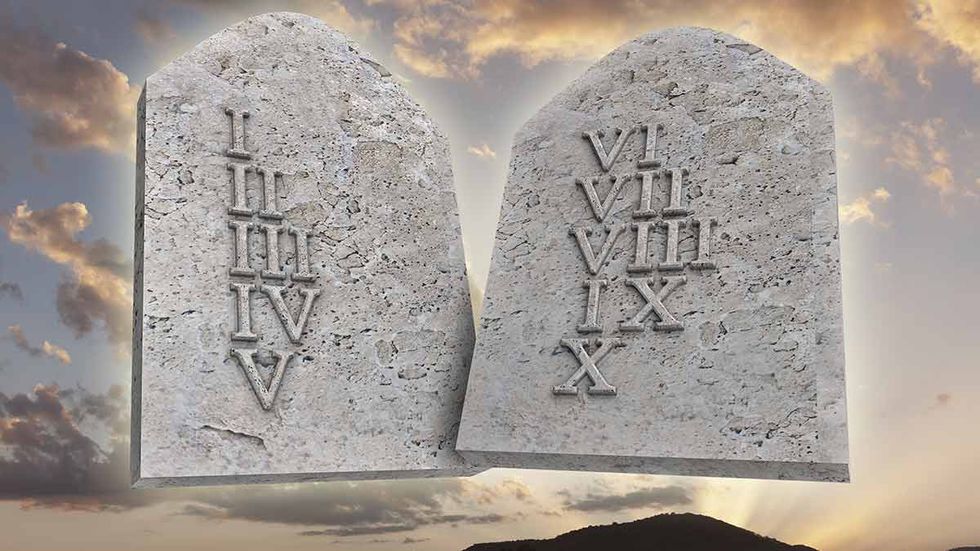
© 2024 Blaze Media LLC. All rights reserved.
What an absurd religious freedom case could mean for Thanksgiving
November 22, 2017
Editor's note: This post was originally published on November 16, 2016. It has been updated to include information about the Bladensburg cross case and to correct typographical errors.
Later this week, we will celebrate Thanksgiving, a day rooted in a national call to prayer and fasting that goes back as far as the Continental Congress and our first few presidents. If federal judges understood the true meaning of Thanksgiving, they'd probably rule it unconstitutional on the grounds that it violates the Establishment Clause of the First Amendment.
For example, consider the case of Felix v. City of Bloomfield, which was decided last year by the 10th Circuit Court of Appeals, in which Judge David Ebel, a Reagan appointee, affirmed a lower court's 2014 decision (by another Republican-appointed judge) to remove a monument of the Ten Commandments because of the perceived “motivation" and the nature of the ceremony inaugurating the monument.
In 2011, at the behest of several city council members, Bloomfield, New Mexico, erected a replica of the Ten Commandments in front of its city hall. Private sources, including several members of the council, completely funded the monument. Symbols like this have been erected in many local and federal government buildings since before our Founding. Anyone who visits the House of Representatives will see a large image of Moses — the man who delivered the Ten Commandments from God — from atop the gallery. Yet the city council still felt it necessary to inscribe a message on the monument that reads:
The City has intentionally opened up the lawn around City Hall as a public forum where local citizens can display monuments that reflect the City's history of law and government. Any message contained on a monument does not necessarily reflect the opinions of the City, but are statements from private citizens. If you would like to display a monument in this forum, please contact the City Clerk, who can give you a copy of the ordinance that explains the procedures for displaying a monument.
During any other era — from our Founding until the past generation — this disclaimer would have been considered ridiculously apologetic and gratuitous. The city council even erected other monuments, such as the Bill of Rights and the Gettysburg Address, to divorce their displays from religious significance.
However, it wasn't enough for the ACLU and those who seek to enforce a secularist inquisition and countermand our entire heritage. The ACLU got a Republican district judge to mandate the removal of the monument in September 2014. Then the 10th Circuit Court of Appeals upheld the decision:
“We cannot speculate what precise actions a government must take" to make a public monument secular enough, the opinion of Senior Judge David Ebel reads. “But we are satisfied here that Bloomfield has not undertaken sufficiently purposeful, public, and persuasive actions to secularize the Monument's previous 'principal or primary' religious message … In fact, it has taken no public, purposeful, and persuasive action to distance itself from the sponsor and his message other than two ineffective disclaimers—one small, the other vague."
In a more recent example, a veterans' memorial — originally erected almost a century ago by the American Legion — at a busy intersection of Bladensburg, Maryland, faces removal because judges have ruled it is a similar violation of the Establishment Clause.
You can learn more about it here:
The truth about the First Amendment's Establishment Clause
Like most aspects of constitutional jurisprudence among the contemporary legal elite, the Establishment Clause has been contorted beyond recognition. What was originally intended to be a legal backstop to keep the federal government from picking denominational favorites has now turned into a means that the judiciary can and will use to scrub anything remotely theistic from the public square — even among local governments.
To begin with, Justice Clarence Thomas is correct in his long-standing view that the Establishment Clause applies only to federal — not state and local — government. Even if one buys into the specious “Incorporation Doctrine" that claims every aspect of the Bill of Rights was retroactively applied to the states by the adoption of the 14th Amendment, that only holds true for the individual rights expressed in those amendments, not the Establishment Clause. Indeed, nine of the 13 states had established religions at the time the Constitution was ratified, and that is precisely the reason why the Framers wanted to keep it out of the federal government.[1]
However, more foundationally, none of these issues we are confronted with today rise anywhere near the threshold of a violation of the Establishment Clause, even by the federal government. During the House floor debate over the First Amendment on August 20, 1789, James Madison explained the purpose of the Establishment Clause as follows:
Congress should not establish a religion, and enforce the legal observation of it by law, nor compel men to worship God in any manner contrary to their conscience.
But this understanding has been turned on its ear to the point that local governments can no longer be viewed as endorsing such controversial theocratic principles as, “Don't kill people," “don't lie about people," and “don't steal people's stuff."
Nobody is compelled to do anything by the mere existence of even blatantly religious symbols that have been in existence since long before our Founding, nor is anyone hurt by acknowledging their role in informing our system of government.
Rather, as has been noted elsewhere on the site, the real, ongoing violation of the Establishment Clause is that of enforcing the public demands of sexual revolutionaries on private citizens because that worldview is actively enforced against individual business owners (and now even churches), compelling them to violate their conscience with their own personal property. The disconnect here is tragically laughable.
The courts have no such power and must be reined in
How can a plaintiff even get standing in court to say he is offended by a policy, much less a monument that is all over our country? That is why we have city councils and state legislatures. If you don't like having the statue there, get rid of it the right way: by petitioning your local government, making your case and changing people's minds. Yet Judge Ebel granted two polytheistic Wiccans standing to sue because the monument is in their view when they go to pay their water bill at the city hall complex!
Federal courts were never given such power to serve as a judicial veto where no individual rights are in jeopardy. As Scalia famously wrote a few years ago, it is not the job of the Constitution or the court to “prevent hurt feelings" or to protect those annoyed by religious symbols more than anyone annoyed by the public playing of rock music.[2]
In the Bloomfield case, that a series of Republican-appointed judges can agree to such a radical post-constitutional jurisprudence overturning our heritage and bastardizing the First Amendment shows how existing constitutional construction within the legal profession is too much to overcome by simply “appointing more conservative judges." It only highlights the need for wholesale judicial reform.
Our heritage, Constitution, and Declaration of Independence (which identifies God as the source of all inalienable rights) have been ruled unconstitutional even by Republican-appointed judges. They take an amendment — which is inherently favorable to religion and merely prohibited the coercion of religious service through threat of penalty — and interpret it as a ban on all innocuous display of anything associated with America's Judeo-Christian Founding.
Is Thanksgiving “unconstitutional?" If you ask these guys, it should be.
Fast-forward to today. It's actually remarkable that we still have a day of Thanksgiving recognized as a national holiday, seeing as the first celebrations of the holiday were overwhelmingly Judeo-Christian in nature. Does it not violate the Establishment Clause in the same fashion to give salaried government employees the day off, given that history? In order to give thanks, you have to give thanks to something. Is this not prohibited government speech?
Or perhaps, in the estimation of Judge Ebel, there is enough football and hedonistic Black Friday madness associated with Thanksgiving that reflect “sufficiently purposeful, public, and persuasive actions to secularize" the holiday's “previous 'principal or primary' religious message" to render it permissible.
Fortunately, the ACLU wasn't around when President Washington first called for a day in November “to be devoted by the people of these States to the service of that great and glorious Being who is the beneficent author of all the good that was, that is, or that will be." Otherwise, we might all be working Thursday.
[1] As Justice Thomas once wrote, “[A]pplying the Clause against the States eliminates their right to establish a religion free from federal interference, thereby “prohibit[ing] exactly what the Establishment Clause protected." [Town of Greece v. Galloway 572 U. S. ____ (2014) (Thomas, J., partial concurrence) slip op. at 4].
[2] Elmbrook School District v. John Doe 573 U. S. ____ (2014), cert. denied, (Scalia, J., dissenting). In this case itself, Thomas and Scalia dissented from the Supreme Court's decision not to grant appeal after the Seventh Circuit Court of Appeals, which included several Republican appointees, completely misread the First Amendment. Which is yet another example of how the lower courts are destroying democracy while the Supreme Court quietly allows the ruling to stand.
Want to leave a tip?
We answer to you. Help keep our content free of advertisers and big tech censorship by leaving a tip today.
Want to join the conversation?
Already a subscriber?
Blaze Podcast Host
Daniel Horowitz is the host of “Conservative Review with Daniel Horowitz” and a senior editor for Blaze News.
RMConservative
more stories
Sign up for the Blaze newsletter
By signing up, you agree to our Privacy Policy and Terms of Use, and agree to receive content that may sometimes include advertisements. You may opt out at any time.
© 2024 Blaze Media LLC. All rights reserved.
Get the stories that matter most delivered directly to your inbox.
By signing up, you agree to our Privacy Policy and Terms of Use, and agree to receive content that may sometimes include advertisements. You may opt out at any time.




